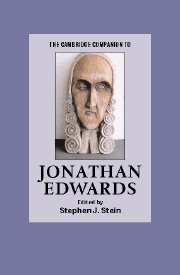Book contents
- Frontmatter
- Introduction
- Part I Edwards’s life and context
- Part II Edwards’s roles and achievements
- 5 Edwards as preacher
- 6 Edwards as revivalist
- 7 Edwards as theologian
- 8 Edwards as philosopher
- 9 Edwards as biblical exegete
- 10 Edwards as missionary
- Part III Edwards’s legacy and reputation
- The Works of Jonathan Edwards
- Further Readings
- Index
- Series List
9 - Edwards as biblical exegete
from Part II - Edwards’s roles and achievements
Published online by Cambridge University Press: 28 November 2007
- Frontmatter
- Introduction
- Part I Edwards’s life and context
- Part II Edwards’s roles and achievements
- 5 Edwards as preacher
- 6 Edwards as revivalist
- 7 Edwards as theologian
- 8 Edwards as philosopher
- 9 Edwards as biblical exegete
- 10 Edwards as missionary
- Part III Edwards’s legacy and reputation
- The Works of Jonathan Edwards
- Further Readings
- Index
- Series List
Summary
In 1740, looking back on earlier years, Jonathan Edwards penned the following statement concerning the central place of the Bible in his personal and professional life. “I had then, and at other times, ” he wrote, “the greatest delight in the holy Scriptures, of any book whatsoever. ” His was an apt summary that, in fact, applied to his entire life. In his statement he also sounded a note of unambiguous spiritual pleasure that he derived from the study of the biblical text. “Oftentimes in reading it, every word seemed to touch my heart. I felt an harmony between something in my heart, and those sweet and powerful words. ” Edwards recollected that the force and power of “every sentence ” was such that often he “could not get along in reading. ” He found himself dwelling “long on one sentence, to see the wonders contained in it. ” In his judgment, “almost every sentence seemed to be full of wonders. ”
By the time that he wrote those reflections, Edwards had awell-developed program of private study of the Bible evident in the notebooks and commentaries that he was compiling. Early in his ministerial career, while serving as a supply minister in New York City, he had “Resolved, to study the Scriptures so steadily, constantly, and frequently, as that I may find, and plainly perceive myself to grow in the knowledge of the same. ”2 Although from time to time he acknowledged difficulty maintaining that high resolve, he never abandoned the goal of steady, constant, and frequent study of the Bible. The evidence of that lifelong commitment is the massive body of exegetical reflections from his hand.
- Type
- Chapter
- Information
- The Cambridge Companion to Jonathan Edwards , pp. 181 - 195Publisher: Cambridge University PressPrint publication year: 2006

